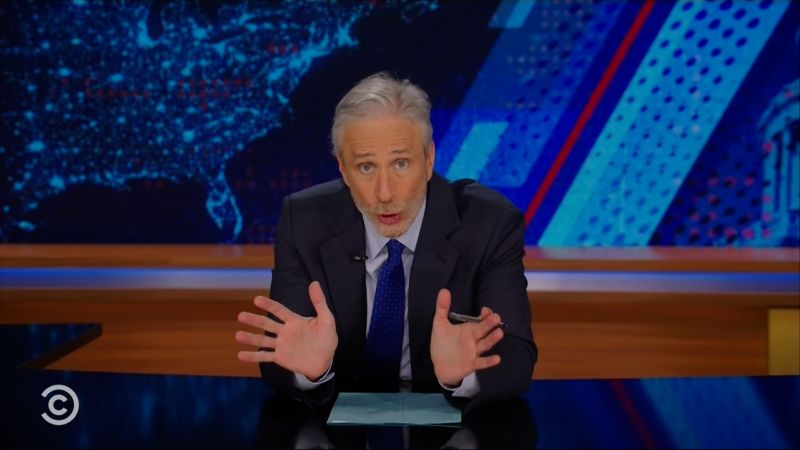Media
Media at a flashpoint: 2019 year in review – CNN

News about the news
Entertainment’s new world order
Business interrupted
Changing of the guards
Media
Jon Stewart Slams the Media for Coverage of Trump Trial – The New York Times


Welcome to Best of Late Night, a rundown of the previous night’s highlights that lets you sleep — and lets us get paid to watch comedy. Here are the 50 best movies on Netflix right now.
Media Circus
Opening arguments began in former President Donald Trump’s criminal trial on Monday, with much of the news media coverage homing in on as many details as possible about the proceedings.
Jon Stewart called the trial a “test of the fairness of the American legal system, but it’s also a test of the media’s ability to cover Donald Trump in a responsible way.”
The Punchiest Punchlines (Insano Edition)
The Bits Worth Watching
Jimmy Kimmel’s sidekick, Guillermo Rodriguez, took the stage with Madonna in Mexico City over the weekend.
What We’re Excited About on Tuesday Night
The economist Stephanie Kelton will chat with Jordan Klepper and Ronny Chieng, the guest co-hosts, on Tuesday’s “Daily Show.”
Also, Check This Out
In “Under the Bridge,” Hulu’s chilling new series, Riley Keough and Lily Gladstone investigate the murder of a teenager.
Media
Jon Stewart lampoons media’s coverage of Trump’s first day at trial – CNN


‘Decisive, definitive and regretful’: Iran’s foreign minister issues warning to Israel
Media
Jon Stewart rips media over coverage of ‘banal’ Trump trial details – The Hill


Jon Stewart blasted the media for covering the “banal” details of former President Trump’s first of four criminal trials, which began with opening statements Monday following a week of jury selection.
In his Monday night broadcast of “The Daily Show,” Stewart poked fun at the TV news media for tracking Trump’s traffic route from Trump Tower to the courtroom, compiling footage from various outlets, as they tracked each turn his car made.
“Seriously, are we going to follow this guy to court every f‑‑‑ing day? Are you trying to make this O.J. [Simpson]? It’s not a chase. He’s commuting,” Stewart said. “So the media’s first attempt — the very first attempt on the first day — at self-control failed.”
Media outlets have closely covered Trump in recent days, as he makes history as the first U.S. president to stand trial on criminal charges. Trump is also the presumptive GOP nominee for president this year.
Trump currently faces 34 criminal counts of falsifying business records in connection to reimbursements to his then-fixer, Michael Cohen, who paid adult film actress Stormy Daniels $130,000 ahead of the 2016 election to stay quiet about an alleged affair she had with the former president a decade prior. It is the first of four criminal trials Trump will face, and perhaps the only one that will go to a jury before the November election.
Stewart, in his broadcast, took aim at TV news outlets, suggesting they were covering small news alerts as significant breaking news developments.
Stewart pretended a producer was talking in his earpiece and paused midsentence, saying, “Hold on. We’re getting breaking news,” and cut to a clip from an earlier interview conducted by CNN’s Jake Tapper, who similarly cut off his guest momentarily to identify a photo displayed on screen to his audience.
“I’m sorry to interrupt. Just for one second. I apologize,” Tapper said in the clip. “We’re just showing the first image of Donald Trump from inside the courtroom. It’s a still photograph that we’re showing there. Just want to make sure our viewers know what they’re looking at.”
Stewart shot back, saying, “Yes, for our viewers who are just waking up from a 30-year coma, this is what Donald Trump has looked like every day for the past 30 years. Same outfit.”
Stewart ripped CNN again for analyzing the courtroom sketches so closely, saying, “It’s a sketch. Why would anyone analyze a sketch like it was — it’d be like looking at the Last Supper and going, ‘Why do you think Jesus looks so sad here? What do you think? It’s because of Judas?’”
“Look, at some point in this trial, something important and revelatory is going to happen,” Stewart said. “But none of us are going to notice, because of the hours spent on his speculative facial ticks. If the media tries to make us feel like the most mundane bullshit is earth-shattering, we won’t believe you when it’s really interesting.”
Copyright 2024 Nexstar Media Inc. All rights reserved. This material may not be published, broadcast, rewritten, or redistributed.
-



 Science22 hours ago
Science22 hours agoOsoyoos commuters invited to celebrate Earth Day with the Leg Day challenge – Oliver/Osoyoos News – Castanet.net
-



 Politics22 hours ago
Politics22 hours agoHaberman on why David Pecker testifying is ‘fundamentally different’ – CNN
-
News23 hours ago
Freeland defends budget measures, as premiers push back on federal involvement – CBC News
-
Economy23 hours ago
The Fed's Forecasting Method Looks Increasingly Outdated as Bernanke Pitches an Alternative – Bloomberg
-



 Health21 hours ago
Health21 hours agoIt's possible to rely on plant proteins without sacrificing training gains, new studies say – The Globe and Mail
-



 Tech21 hours ago
Tech21 hours agoMeta Expands VR Operating System to Third-Party Hardware Makers – MacRumors
-
Business22 hours ago
Gildan replacing five directors ahead of AGM, will back two Browning West nominees – Yahoo Canada Finance
-



 Politics21 hours ago
Politics21 hours agoFareed’s take: There’s been an unprecedented wave of migration to the West – CNN








